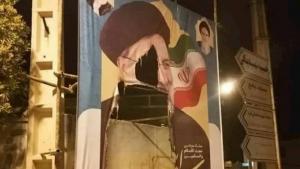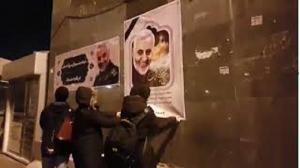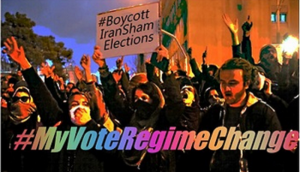(Video) Iran’s Election Will Reveal Extent Of Opposition Momentum Outside The Political System
The Iranian officials and state media outlets pointed to the public's endorsement of the boycott as a sign of the growing influence of the MEK.
Over the past several weeks, the presidential election has been condemned as illegitimate in the context of various protests, over various topics, by various groups.”
PARIS, FRANCE, June 17, 2021 /EINPresswire.com/ -- Iranian regime’s sham presidential campaign ends today and voting takes place on Friday. But it is widely understood that voting is just a formality and one in which the vast majority of Iranians will not take part. Even Iranian state media has been acknowledging this latter fact.— NCRI
Over the past several weeks, the presidential election has been condemned as illegitimate in the context of various protests, over various topics, by various groups. Pensioners demonstrated to call attention to their growing difficulty at paying for the basic necessities of life; workers assembled to demand unpaid wages; middle-class investors protested the losses they’d suffered from a government-run investment scam; and in each case, the participants were heard to chant slogans like “we have seen no justice; we will not vote anymore.”
The Iranian officials and state media outlets pointed to their endorsement of the boycott as a sign of the growing influence of the leading pro-democracy dissident group. Their warnings about that growth date back at least to the beginning of 2018, which marked the first in a series of uprisings that featured slogans with origins in the People’s Mojahedin Organization of Iran (PMOI/MEK) and the National Council of Resistance of Iran (NCRI) discourse. The uprising was comprised of protests in well over 100 cities and towns, and it expressed a collective demand for the resignation or ouster of all leading officials, and a rejection of both the “hardline” and “reformist” branches of mainstream Iranian politics.
That latter point was clearly reiterated in the boycott of the February 2020 election, though its relevance to Iran’s political process diminished somewhat in the run-up to the parliamentary races, and even more so in advance of the presidential campaign. Although the current boycott movement certainly traces its roots back to the January 2018 uprising, its appeal was greatly amplified by the recognition of Friday’s election as an even greater sham than previous proceedings.
Ebrahim Raisi’s reputation emerged in earnest during the summer of 1988, when he served as one of the key figures in Tehran’s “death commission,” which was tasked with interrogating political prisoners and determine who among them still loyal to the MEK and should be slated for summary execution. Nationwide, similar death commissions oversaw the mass execution and secret burial of over 30,000 political prisoners, and Raisi’s Tehran body was responsible for the majority of them.
Raisi’s legacy of brutality has continued to evolve since then, right through his tenure as judiciary chief. About eight months into that role, Raisi’s commitment to violent repression was put to the test by the outbreak of a second nationwide uprising. The protests of November 2019 arose fairly spontaneously in nearly 200 cities and towns, and immediately took up the same expressions of support for regime change as had defined the January 2018 movement.
In response, authorities opened fire on crowds of protesters, carried out mass arrests, and began systematically torturing detainees.
Reuters eventually confirmed the NCRI’s initial tally of 1,500 shooting deaths during just several days when that uprising was active. The number of subsequent arrests is estimated at around 12,000, and an Amnesty International report on the fallout from the uprising noted that the resulting torture took place over a period of several months.
There is little doubt that the intensity of this crackdown was influenced by the fact that both uprisings were indelibly associated with the MEK – the main target of the death commissions’ activities during the 1988 massacre. That being the case, it stands to reason that further crackdowns will follow the widespread embrace of a MEK-led electoral boycott, especially if, as predicted the boycott signals the imminent arrival of another nationwide uprising, this one “much more intense and widespread than in recent years.”
The clerical regime is evidently in a panic over this prospect. One media outlet with close ties to Khamenei’s hardline political faction, the Students News Network, said of the growing support for the MEK, “It is not clear whether we can stop this trend even with thousands of actions.” The piece went on to note that although Tehran has leveraged state security forces, coordinated propaganda, and recruitment of former MEK members as part of a wide-ranging effort to disrupt the group’s momentum, and yet still “this opportunist enemy is recruiting youth on a large scale.”
Friday’s election will be the latest and arguably one of the most significant signifiers of just how large that scale is. It is already obvious that Iranian authorities will be paying attention to the outcome and planning their response immediately. American and European policymakers have a duty to do the same. Not only that, they have a duty to anticipate Tehran’s response and plan their own response to it, on the understanding that with Raisi poised to take over the presidency, serious human rights abuses will surely ensue unless someone intervenes to stop them, and stop the policy of appeasement.
Shahin Gobadi
NCRI
+33 6 50 11 98 48
email us here
Visit us on social media:
Facebook
Twitter
Iran's streets depict people's will to boycott the 2021 sham presidential election
Legal Disclaimer:
EIN Presswire provides this news content "as is" without warranty of any kind. We do not accept any responsibility or liability for the accuracy, content, images, videos, licenses, completeness, legality, or reliability of the information contained in this article. If you have any complaints or copyright issues related to this article, kindly contact the author above.



